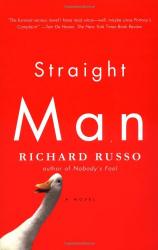Reading Group Guide
Discussion Questions
Straight Man

1. Why does Hank begin his tale with the story about his parents getting him a dog? What does this story tell us about the Devereaux family, and of Hank's place within it? "To me, his son, William Henry Devereaux, Sr., is most real standing in his ruined cordovan loafers, leaning on the handle of a borrowed shovel, examining his dirty, blistered hands, and receiving my suggestion of what to name a dead dog" [p. xvii], Hank writes. What is it about the moment, and the act, that shows up Devereaux, Sr.'s essential realty?
2. Why did Hank decide to become a writer, and an English professor?
3. "Teddy belongs to that vast majority who believe that love isn't something you kid about. I don't see how you could not kid about love and still claim to have a sense of humor" [p. 7]. Is this the real Hank talking, or is it part of the compulsive cynicism that his mental state has engendered? Is it in fact a cynical observation, or simply a true one?
4. Early in the book, various characters, including Lily and Hank's mother, let Hank know that they are worried about him. What symptoms of distress and instability does Hank show in the first half of the book? How do we, the readers, know that there is in fact something to worry about?
5. Why does Hank have persistent fantasies of seeing Lily with other men? Do these fantasies represent his fears, or his desires?
6. Hank dreads his colleagues moving to Allegheny Wells and becoming his neighbors. Lily wonders why: "Jacob Rose is your friend," she says. "There's nothing wrong with Finny and Marie" [p. 29]. Is she right: are they his friends? If so, why has Hank become so suspicious of them?
7. Why has Julie chosen to build a replica of her parents' house? Why does Russell hate it, while liking Hank and Lily's house? What does Russell and Julie's stalemate over the house tell us about their marriage, and their life together?
8. "Anger . . . is an emotion that's foreign to me" [p. 52], says Hank. Is that true? What signs of anger do you find in his behavior? Why might he choose to suppress anger?
9. What effect does the academic tenure system have upon the tenured professors themselves? When Lily goes on her job interview, Hank finds himself filled with admiration for her; "Tenured these last fifteen years, I find it hard to imagine being in that position again, of allowing myself to be judged" [p. 59]. Why does Hank make his surprising career decision at the end of the novel?
10. Why does Russo call the first portion of the novel "Occam's Razor"? William of Occam, says Hank, "sought to reconcile Faith with rational inquiry" [p. 107]. Would you say that this describes Hank's search during the course of the novel?
11. "In English departments the most serious competition is for the role of straight man" [p. 106]. What does Hank mean by this? Is the meaning of the novel's title clear after Hank makes this statement?
12. Why does Hank keep harping on William Cherry, the man who lay down on the town's railroad tracks?
13. Why has Hank never written another book after his first, quite successful one? Is there any indication that he will write one in the future: that is, after the action of the novel has ended?
14. The character of Hank's mother is a complex one. What does she want for herself? For Hank? What bargains has she made with life? What has she given up? Is there any chance, at the end, for her and Hank to become close to one another?
15. Why does Hank feel exhilaration rather than fear when he suspects he may have prostate cancer? Is this feeling related to his fascination with William Cherry? With his fantasies about Lily?
16. West Central Pennsylvania University is clearly a mediocre institution; when it comes to hiring the new chairperson, for instance, Hank admits that "to hire someone distinguished would be to invite comparison with ourselves, who were undistinguished" [p. 18]. Part of middle age, for many people, is settling for the second-rate, the acceptance of life's inevitable limitations. "We have believed, all of us, like Scuffy the Tugboat, that we were made for better things. . . . We've preferred not to face the distinct possibility that if we'd been made for better things, we'd have done those things" [p. 132-3]. Does this process of settling, or acceptance, diminish Hank, or does it strengthen him? Why does Russo include the Spender poem on page 207?
17. How does Hank's midlife crisis compare with that of his father at Columbia? Is Hank's crisis successful: that is, does he resolve the pain and fear that has begun to emerge from his subconscious and take over his life? Did Hank's father resolve any such issues when he broke down at Columbia? What might the father's present emotional state have to do with his having coped, or refusing to cope, with that breakdown? What do his changing attitudes towards Dickens signify, and what does his admission that he had misjudged Dickens tell us about his mental state?
Straight Man
- Publication Date: June 9, 1998
- Paperback: 391 pages
- Publisher: Vintage
- ISBN-10: 0375701907
- ISBN-13: 9780375701900








